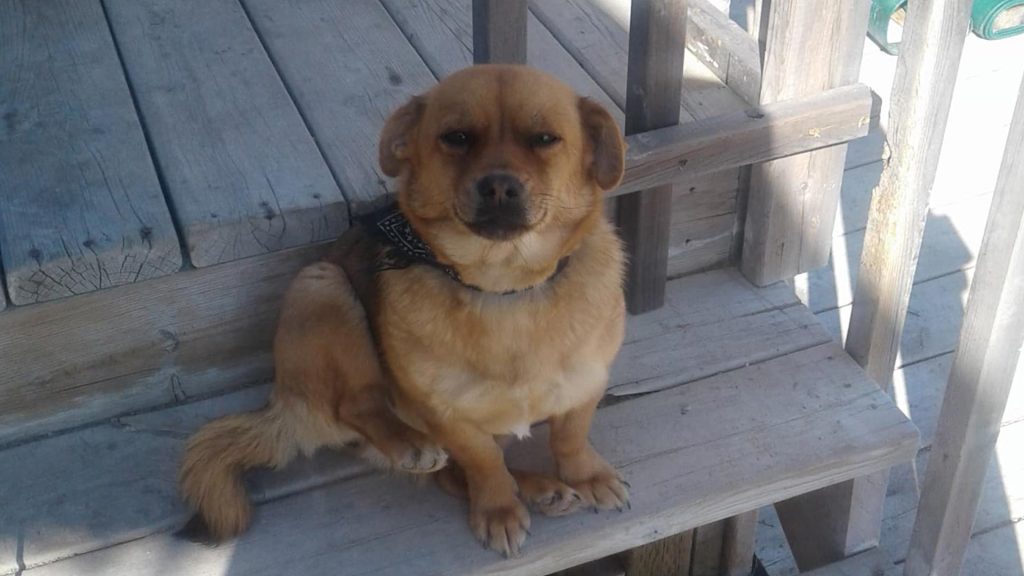
(A dispute over a vet bill has sent Pickles from Pinaymootang First Nation to a new home off-reserve. Submitted photo)
A First Nations father is asking a Winnipeg-based dog rescue group to return his family’s pet after a falling out over a veterinary bill.
“We lost our dog,” Grant Shorting said in a telephone interview from his home on Pinaymootang First Nation, about 220 kilometres northwest of Winnipeg.
“It’s like losing a family member.”
Shorting said it was February when he turned to Manitoba Underdogs Rescue (MUR) for help with his pregnant dog, Pickles.
The small, mixed-breed he purchased two years ago in Winnipeg was carrying an oversized litter of nine pups and he was worried about her.
But he couldn’t afford to take her to the veterinarian because he wasn’t working due to a disability.
“The pregnancy was taking a toll on her,” he said. “She was sticking out so much she looked like a little cow.”
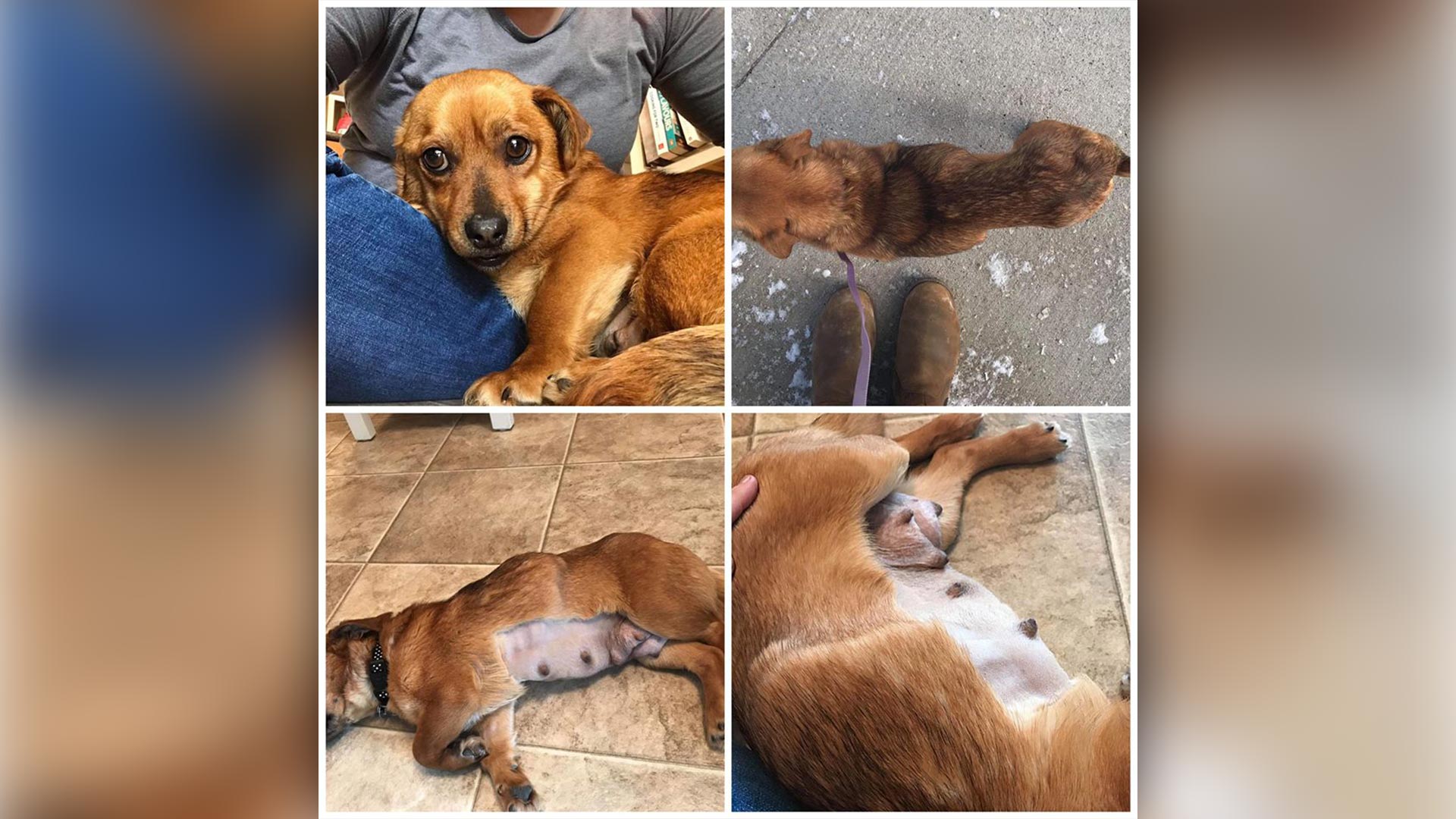
Jessica Hansen, MUR’s executive director, responded immediately when Shorting reached out to the group on Facebook, a screengrab of the messages shared with APTN News shows.
Hansen declined to be interviewed for this story and MUR sent a written statement to APTN on her behalf. It referred all further questions to its lawyer.
“On February 4, 2020 we were contacted via Facebook by a man who was concerned for his heavily pregnant dog Pickles,” the emailed statement said.
“We offered to bring her to Winnipeg for an exam to see what was wrong with her. He agreed and signed a form saying that MUR and our vets had authorization to do what was needed to save the dog.”
The Facebook conversation shows the pair discussed the cost of veterinary care and the possibility Pickles may need an expensive caesarean section. Hansen asked Shorting to contribute $100 towards the medical bill before Pickles would be returned.
Shorting said he couldn’t pay upfront but offered to provide it when funds came in. He told APTN he believed the form, which he said he only had a few minutes to scan before signing, gave MUR the puppies but not Pickles.
But that’s not what the form, which MUR also shared with APTN, showed.
The two MUR volunteers who came to get Pickles weren’t at his house long but Shorting said he appreciated how they took time to comfort his child.
“My daughter was very upset,” he said of his four-year-old. “They said they would take good care of (Pickles) and bring her back.”
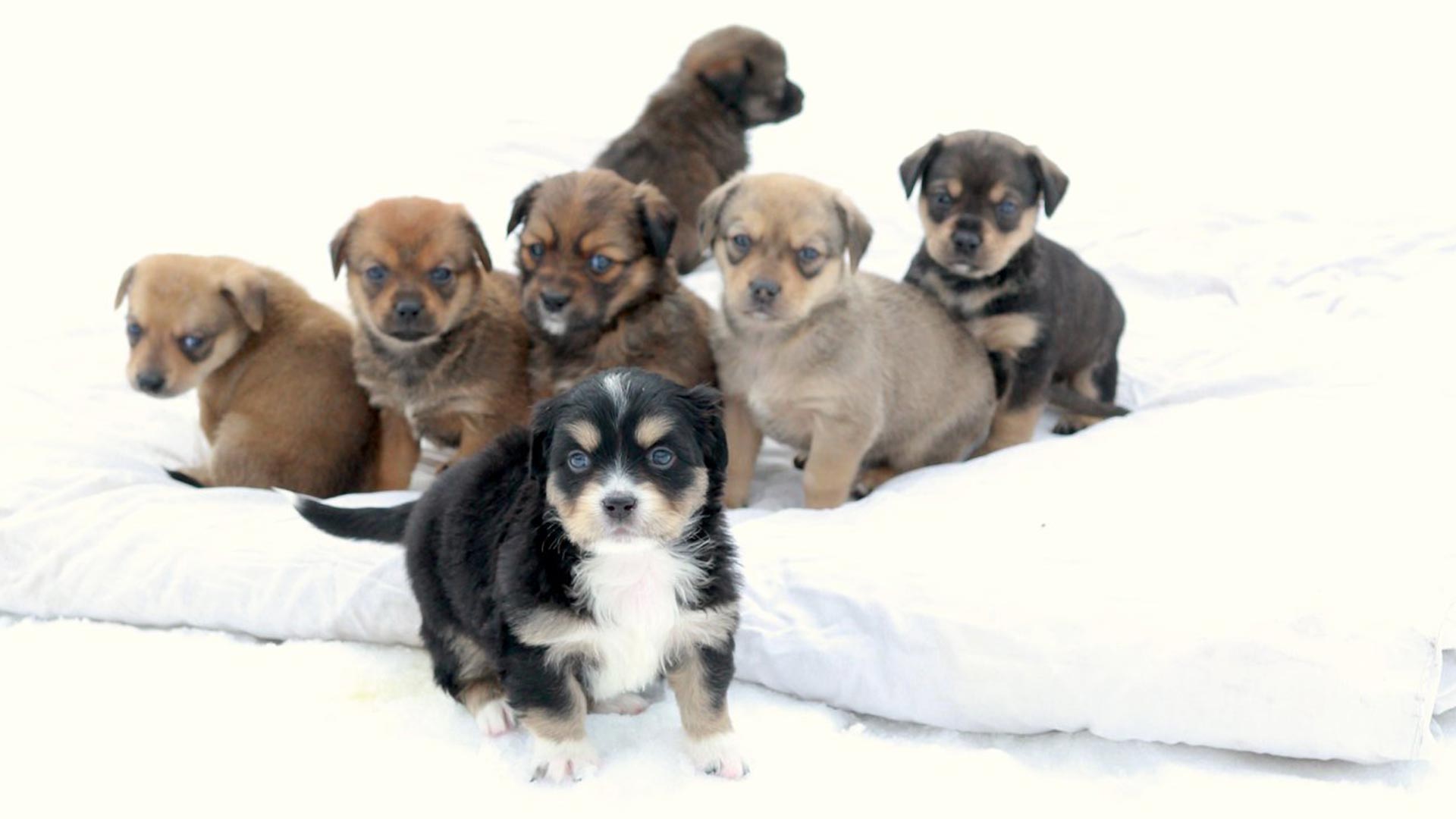
MUR describes itself as a registered charity and non-profit organization.
It’s one of several rescue groups in Manitoba that partners with the Winnipeg Humane Society and First Nations to re-home unwanted animals and provide veterinary care to keep the stray dog population in check.
Shorting said he took Pickles to one of those spay/neuter clinics near the end of 2019 to have her fixed, but it was too busy and he couldn’t get in.
He said he planned to take her to the next clinic a few months later and did his best to keep her in her doghouse until then, but she escaped and mated with another dog.
“She needed vet care we couldn’t afford at the time,” he told APTN.
“I called (MUR) because they say they work with First Nations.”
In fact, it was rescuing a dog near Manitoba’s Brokenhead First Nation in July 2011 that first set MUR on its path, the group said on its website.
“Our mission is to rescue, rehabilitate, care for, and ultimately seek out permanent and loving homes for Manitoba’s unwanted animals,” the website said.

MUR notes it doesn’t operate a shelter and relies on volunteer foster homes and financial donations to process “20-25 adoptions monthly” with more than “2,000 dogs rescued to date.”
But Shorting said his experience shows a different side of that mission.
He feels his dog, who Facebook posts show MUR renamed “Miami” and then “Eve,” was taken without the group’s followers getting the full story.
“Makes you wonder if this really is a non for profit organization that they claim they are,” Shorting told APTN.
In their Facebook conversation, Hansen said MUR would cover the cost of the “lifesaving” operation if Shorting surrendered his pet.
“I’m sorry that there aren’t any better options. I know you and your family love Pickles,” she wrote.
Hansen said Pickles and the puppies survived the surgery that cost $1,041.
She then asked if Shorting had been feeding the dog.
“Her condition is very poor. She is very emaciated. Does she get food every day?” she wrote.

MUR later shared with APTN the veterinarian’s assessment that supported this statement.
Shorting said the dog was eating, but he had to feed his children first. He appeared to shock Hansen when he asks how much it would cost to euthanize Pickles.
“What do you mean? If she didn’t get the surgery, she would have died along with the puppies. We saved your dog’s life,” she wrote.
When asked by APTN why he asked about putting Pickles down Shorting said: “I said to euthanize Pickles out of frustration cause why should someone else have our dog if we can’t? We miss our family dog every day but we live in a reserve and don’t have many opportunities for employment and couldn’t afford that ridiculous amount.”
Back in the Facebook conversation, Shorting seems surprised Pickles had the procedure without his permission and asked for her back, but that was also covered by the form he signed.
“And yeah she has food,” he told Hansen.
The head of the Winnipeg Humane Society, Manitoba’s biggest pet education organization, said there is a grey area when it comes to animal rights groups in Manitoba.
“Anybody can call themselves a pet rescue,” said CEO Javier Schwersensky, who wasn’t surprised to hear about a conflict.

Despite the best intentions of the animal rights movement, Schwersensky said, “It’s very white and very judgy… It’s a whole bunch of white people who think they know best.”
Schwersensky said he is working to educate his staff and volunteers about their attitudes towards rescued animals and where they come from.
“My fight is to eliminate the built-in bias (that) when you see a person a certain way it must be this or that,” he said in a telephone interview.
“We have a long history of doing that with awful results. We need to do better,” he added, noting a “lack of resources” does not mean “a lack of love.”
Shorting said he loves Pickles and didn’t like being questioned about her care. He’s not a veterinarian but suggested the food she was eating while pregnant was nourishing her puppies and not her.
“We love our dog. (They) make us look like (she’s a) rez dog,” he said of the term for stray, outdoor dogs that sometimes roam First Nations in packs and can be aggressive.
Hansen, however, felt Shorting should be thanking MUR.
“Our volunteers jumped to help you and drove out last night,” she wrote during their Facebook conversation. “They hit a deer on the way back, and thank god they’re fine. They brought your dog directly to the vet for emergency medical attention that you agreed to let us have her assessed. I told you to expect she may need the c-section. Then I told you she had it.
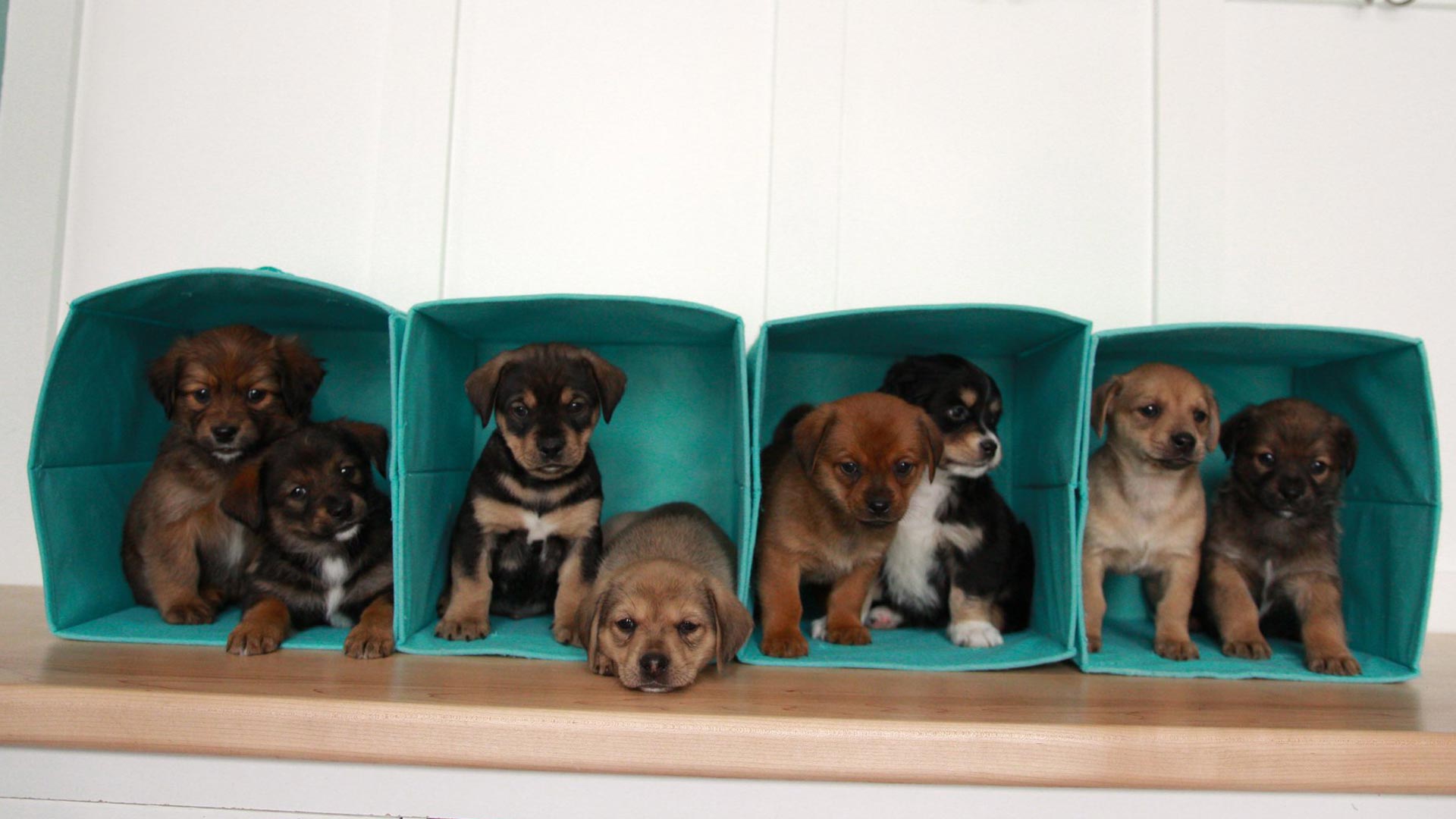
“If you loved this dog, you wouldn’t be upset. You would be grateful.”
She then said Shorting could have been charged with neglect.
“You could have been charged (and still could be) with neglect had this not been done as it falls under ‘causing undue suffering and denying an animal medical attention’,” she wrote.
To which Shorting replied: “Now your (sic) Threatening Me??? Go ahead and Charge me then.”
“We don’t want to,” Hansen responded, reminding Shorting he signed a contract. “We want Pickles to have the best chance she can have.”
“Just for that,” Shorting said back, “we Ask for her return Kindly, she’s Our Dog.”
When the Facebook conversation resumes after several weeks, Hansen said Shorting’s lack of contact means the dog was abandoned.
“If you wish to have Pickles/Eve returned to you as originally demanded, we require full payment of the veterinary bill which totalled $2,358.75. Please find attached a copy of the invoice,” she wrote.

In the meantime, Pickles’ puppies were showcased on Facebook.
MUR created a special page called “Supernatural Puppies” with posts showing them thriving with the help of volunteer bottle feeders because “their mama had a difficult recovery and was far too emaciated to be able to care for her babies.”
Another post described the mom as “malnourished”, “unwell” and said she “required an emergency c-section to save both her life and the lives of her puppies.”
Later, the pups were advertised for adoption in what appears to be professional photos under the names: “Mills, Campbell, Walker, Rosen, Crowley, Singer and Harvelle” among others.
“The Supernatural Puppies are a mixed breed (totally unknown mix; mama Eve is a small breed mix but dad(s) could have been absolutely anything) litter of puppies,” the page said.
“They will be available for applications around 6+ weeks of age, and adoptable at 8+ weeks of age, through Manitoba Underdogs Rescue.”
Shorting said he didn’t like the picture that was being painted.
“They don’t mention us at all asking for help with our dog, they’re clearly trying to make themselves look good in the public view,” he told APTN.
“They really made us as Aboriginal People look bad and careless for caring for our family pet.”
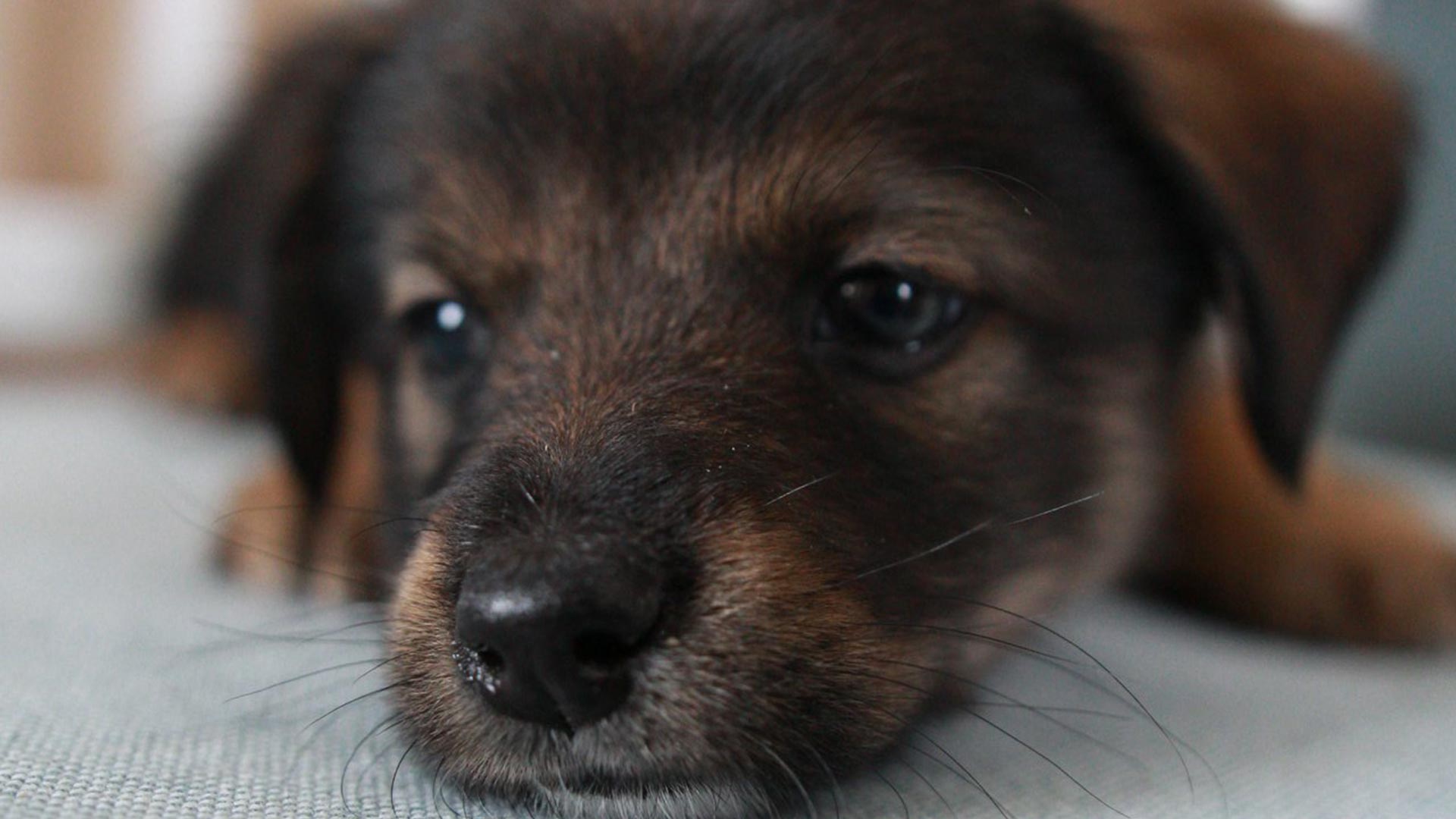
Shorting said he tried to defend himself on MUR’s Facebook page where Pickles was described as a rescue. But after explaining she was a “surrender for medical care” he said he was ultimately blocked from writing anything.
He said MUR made money from the puppies’ adoption fees that could be put towards his vet bill and see his family dog returned.
MUR, in its statement to APTN, said it “acted legally, in accordance with our procedures, and in the best interest of the animal.
“We are aware of the gentleman’s accusations and they are completely inaccurate.”
MUR referred APTN’s questions, which included whether there had been a misunderstanding, was a resolution possible, and did MUR consider returning the dog and helping improve her diet, to its lawyer, who also declined to be interviewed.
“We have no further comment on this matter,” it said in the statement.
Schwersensky said animal welfare in Manitoba is part of the Agriculture portfolio and the responsibility of the chief veterinary office.
APTN requested an interview with the chief veterinarian, but he was not made available.
The Manitoba Veterinary Association, whom APTN also contacted, said it only deals with veterinarians and not rescue groups.

Shorting said he is still trying to get Pickles back. He said he has spoken to his band council and an Indigenous provincial politician for assistance.
“Yeah, we see our dog claims to be adopted now, we’re just finding out this morning,” he said in a message to APTN.
“It’s heartbreaking actually.”
Schwersensky said the Winnipeg Humane Society is working towards reconciliation with Indigenous communities when it comes to their mutual interest in animal welfare.
He said it requires a letter from rescue groups it partners with to show they have band council permission to be in the community and operate a spay/neuter clinic.
“Some rescues get it and some don’t,” he said of the need to be respectful and communicate before taking action.
“We as a society need to be committed to change and have a willingness to learn,” he added. “You can’t just judge.”
In the organization’s values it lists online, MUR said it works “alongside Manitoban communities to bring dogs in need into care.”

It said rescue animals “get a second chance at life” and “learn what it is means to be loved.”
MUR promises to supply volunteers who act as foster parents pet food, a collar and leash, a kennel, and – when available – toys and treats.
“Any and all vetting expenses for your foster pet(s) is covered; you are never required to pay out of pocket,” it said on its website.
“Our foster team will ensure you’re feeling comfortable and confident as an Underdogs foster, and will provide training advice as needed. Our vetting team will answer any questions regarding your foster’s health, including vaccinations, alteration and deworming…
“Our dedicated team of volunteers is always available over Facebook, telephone or email. If you have any questions, concerns or need advice, we are here to support you!”
But instead of being supported, Shorting said he feels blamed and shamed – particularly on MUR’s Facebook page where he said he was unable to share his side of the story.
“My daughter is devastated,” he said, noting his wife, other children and pets miss having Pickles around.
“We’re hoping that light will still be shined on this issue. What else can we do?”










